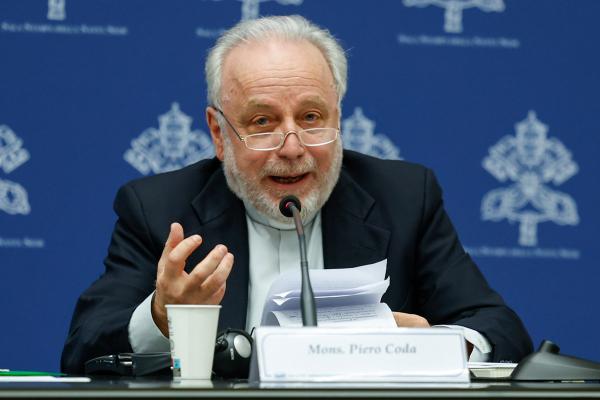
Pope Francis has decided that some of the most controversial issues raised at the first assembly of the Synod of Bishops on synodality will be examined by study groups that will work beyond the synod's final assembly in October.
The possible revision of guidelines for the training of priests and deacons, "the role of women in the Church and their participation in decision-making/taking processes and community leadership," a possible revision of the way bishops are chosen and a revision of norms for the relationship between bishops and the religious orders working in their dioceses all will be the subject of study groups.
That Pope Francis did not wait until the end of the second assembly to convoke the study groups, "shows that he has a heart that listens; he listened and is acting," Cardinal Mario Grech, secretary-general of the synod, told reporters March 14.
Pope Francis approved the 10 groups and their topics. He asked the groups, coordinated by different offices of the Roman Curia, to make a preliminary report to the synod's second assembly in October and to give him a final report on their work by June 2025.
Msgr. Piero Coda, secretary general of the International Theological Commission, a papally appointed body that serves the Dicastery for the Doctrine of the Faith, said the groups "certainly" will discuss specific issues such as the possibility of women deacons, the involvement of laypeople in the choice of bishops and a greater acceptance of LGBTQ+ Catholics.
In a letter to Cardinal Grech, released March 14, Pope Francis said that with the study groups working on issues "requiring in-depth study," members of the synodal assembly in October will be able "to focus more easily on the general theme that I assigned to it at the time, and which can now be summarized in the question: 'How to be a synodal Church in mission?'"
Pope Francis named the 10 themes to be explored by the study groups and provided references to where those themes were discussed in the first assembly's synthesis report (SR) last October:
Cardinal Grech said Pope Francis approved inviting to the synod assembly four additional representatives of other Christian churches and communities so that in October there will be 16 "fraternal delegates."
In addition, Archbishop Filippo Iannone, prefect of the Dicastery for Legislative Texts, told reporters a commission already is studying possible revisions to the Eastern and Latin codes of canon law with a focus on strengthening "synodality," or the participation of all the baptized in the life and mission of the Church while respecting the different forms of service to which laypeople and clerics are called.
Please read our Comments Policy before posting.
Article comments powered by Disqus Sociologist studying parishes eager for synodal role
Sociologist studying parishes eager for synodal role
 U.S. bishops to hold new rounds of listening sessions
U.S. bishops to hold new rounds of listening sessions
 2023 Year in Review: Community, teamwork prove pivotal
2023 Year in Review: Community, teamwork prove pivotal
 Bishop Barron criticizes synod’s report on morality
Bishop Barron criticizes synod’s report on morality
 10 things to know about upcoming Synod on Synodality
10 things to know about upcoming Synod on Synodality
 Don’t let misconceptions cause faith to waver
Don’t let misconceptions cause faith to waver
 Seniors, whatever storms may come, Jesus will be there
Seniors, whatever storms may come, Jesus will be there
 Studio 3:16 offers new approach to teaching religion
Studio 3:16 offers new approach to teaching religion
 After three decades, NLR principal plans to retire
After three decades, NLR principal plans to retire
 CHS athlete overcomes odds to reach collegiate goal
CHS athlete overcomes odds to reach collegiate goal
 St. Joseph a model of solidarity with immigrants
St. Joseph a model of solidarity with immigrants
 Two gifts after Jesus’ death: Virgin Mary and Eucharist
Two gifts after Jesus’ death: Virgin Mary and Eucharist
 Why we have an altar, and not just a communion table
Why we have an altar, and not just a communion table
 Pope: Wars should be resolved through nonviolence
Pope: Wars should be resolved through nonviolence
 Living relationship with Jesus Christ in the Eucharist
Living relationship with Jesus Christ in the Eucharist